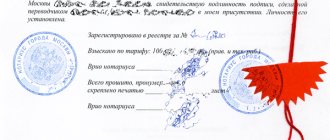Last update: 05/15/2021
What do you need to know about the rules for selling privatized apartment? What are the features here?
Privatization of an apartment is a free transfer of ownership of the apartment to people who live in it under a social tenancy agreement (municipal tenants). In essence, this is a gift to residents from the state.
True, this gift carries not only new rights and opportunities for residents, but also certain duties and responsibilities. In particular, the obligation to maintain the apartment and common areas, the obligation to pay real estate taxes, etc.
In other words, like many things in life, privatizing an apartment has its pros and cons .
♦ Pros and cons of apartment privatization ♦ (Click! Opens in a pop-up window.)
The procedure and conditions for privatization are regulated by Law FZ-1541-1 “On the privatization of housing stock in the Russian Federation” of July 4, 1991.
The apartment can be transferred to the family members living in it either as a common joint property or as a common shared property (for more information about the types of property, see the links).
What mistakes do participants in transactions for the purchase and sale of apartments on the secondary market make - see in this section.
Transfer of rights when purchasing a privatized apartment
The sale of a privatized or municipal apartment involves the transfer of ownership of not only the actual square meters, but also the ownership rights to them.
If privatized housing is involved in the purchase and sale transaction, then the new owner becomes the rightful owner of the apartment , which will be in his ownership.
If non-privatized housing is involved in the transaction, then limited ownership rights along with the apartment are transferred to the new owner - he becomes the tenant of the apartment on the basis of a social tenancy agreement.
Is it necessary to privatize the purchased apartment?
Yes, the purchased apartment must be privatized. The main advantage of a privatized apartment, room or share is that it becomes property (what a sample purchase and sale agreement for a share in an apartment between relatives looks like and what documents are needed, read here). As you know, the owner has the right to dispose of his property at his discretion - he can sell it, change it, donate it or bequeath it at his discretion.
It is worth remembering that only privatized housing . If a single owner of a non-privatized apartment dies, then no laws on inheritance of relatives of different lines apply. In this case, the apartment becomes the property of the state .
One of the advantages of privatized housing is that it can act as collateral for a large bank loan. But in this case, it is worth remembering that this fact will be a burden until full payment is made if the apartment is put up for sale. Of course, you can sell it, but not every buyer agrees to take responsibility for paying off other people's bank debts.
In a privatized apartment, the owner has the right to register any persons at his own discretion , without coordinating this issue with representatives of local authorities.
The owner of the property can also, at his own discretion and without additional approval from regulatory authorities, rent out the apartment.
At the same time, he is obliged to pay a tax of 13% to the state on the profit received.
The tax is calculated based on the amount specified in the rental agreement.
According to the real estate tax law that came into force in 2014, home owners are required to pay tax based on its value.
Apartment owners also pay for major repairs of the buildings in which their apartments are located. Before privatization, this expense item was the responsibility of city and municipal authorities. For families with a minimum income, such expenses may become too high.
Is it necessary to privatize an apartment?
The purchased apartment must be privatized at will ; it can also be left in the ownership of the municipality.
The Russian government regularly postpones the end of privatization, and recently a law has been considered to make it indefinite.
Therefore, if citizens are in line to improve their housing conditions, or for some other reason they are using a social rental agreement and are not privatizing their housing, then there is no point in rushing yet.
Non-privatized housing can also participate in sales transactions - it can be exchanged for a larger or smaller area with an appropriate surcharge. Only in this case will an exchange agreement be concluded, since only property can be sold.
Making a deal
Usually, registering a transfer of rights in Rosreestr is enough to draw up an agreement and put the signature of both parties to the transaction, especially since they will also have to be present when submitting documents for registration - and this is enough to confirm their consent. But this is not always enough - sometimes it is required that the agreement be certified by a notary.
Cases when a notary is needed
Without the participation of a notary, contracts will not be accepted in Rosreestr:
- For the sale of shares.
- If the seller is a minor. If he is between 14 and 18 years old, he will have to participate in the transaction personally; if he is younger, his parents or guardians will sign instead, and he will need to obtain consent from the guardianship and trusteeship authorities.
- If the apartment is owned by a person with limited legal capacity or an incapacitated citizen. In case of complete incapacity, his interests in the transaction will be represented by a guardian, in case of limited incapacity - by himself, but written consent from the trustee will be required.
How to buy?
Next, consider a scheme that will help you purchase a privatized apartment:
- Buyers decide on the choice of apartment;
- A preliminary advance or deposit agreement is concluded with the seller, where he provides the documents necessary for verification and conclusion of the transaction, the timing of the transaction is agreed upon, and the final cost is agreed upon (read about the preliminary agreement for the purchase and sale of an apartment in this material);
- The documents of the apartment owners and documents for the apartment itself are checked;
- The purchase and sale agreement is drawn up and carefully checked by both parties;
- Meeting to sign an agreement and deposit money in a safe deposit box (today this method of transferring money is the safest);
- The signed documents are submitted for registration to the Registration Chamber, where both parties to the transaction receive a receipt for receipt of the documents and an indication of the deadline for their receipt;
- At a certain time, the parties or their representatives take away the registered documents;
- The parties sign the Acceptance and Transfer Certificate of the apartment in accordance with the purchase and sale agreement.
Registration and registration
Before registering property rights at the MFC, pay attention to the terms of the agreement, namely:
- data of sellers and buyers;
- data on the property;
- apartment price and payment procedure;
- registered persons;
- procedure for vacating an apartment;
- act of acceptance and transfer of residential premises;
- permission from guardianship authorities (minor children);
- notarized power of attorney for sale (if it is not the owner who is selling);
- additional conditions as agreed by the parties.
Having prepared the purchase and sale agreement and checked all the data, you need to register the transaction with the MFC. To do this you need:
- make an appointment for a specific date and time;
- hand over documents to the center employee;
- pay a state fee of 2000 rubles;
- receive a receipt for documents acceptance.
The statement will indicate the date when you can pick up the registered documents. From this moment you become the owner of the apartment. The entire process of collecting documents, completing the purchase and obtaining ownership rights to a residential premises takes no more than a month.
Documents for purchasing an apartment
To complete the transaction, both parties must provide certain documents.
Buyers are required to:
- Valid passports;
- Marriage certificate (if buyers are married);
- Notarized declaration that the buyer is not married (if he is not married);
- Notarized power of attorney and passport of the buyer's representative (if the transaction is concluded on behalf of the buyer by his representative).
In order for a buyer to buy a privatized apartment, the seller must provide the following documents:
- Valid passports of all sellers;
- Originals of title documents;
- The registration certificate of the premises, which is issued by the BTI and is valid for 5 years from the date of issue;
- Unified Housing Document, which includes a certificate of absence of debts on utility bills, an extract from the house register and a copy of the financial and personal account;
- IPA and ND certificates;
- Notarized consent of the spouse, if the apartment was purchased during marriage;
- If one of the owners is a minor, then the consent of the guardianship authorities to carry out the transaction (we talked about the sale of an apartment with minor owners here);
- If his representative acts on behalf of the seller, then a notarized general power of attorney in his name;
- Extract from the Unified State Register. But this document is usually ordered by the buyer himself in order to make sure that the seller really is the owner at the time of the transaction.
Main risks
How to reduce the risks of buying a privatized apartment? To answer this question, you need to know what they are.
Refuseniks
The residential premises are owned by one person, and the remaining residents have written a refusal to privatize, but are registered in the apartment. In this case, it is necessary that before registering the agreement:
- all persons not participating in the transaction have checked out of the apartment;
- or have undertaken notarial obligations to deregister;
- or personally wrote an application for deregistration.
Otherwise, it's worth considering other options.
Attention! All persons who are not the owners of a privatized apartment, but who are registered (refuseniks), have the right of indefinite residence. You will not be able to write them out, even through the court.
The owners are minors
In this case, it is necessary to obtain permission to sell from the guardianship and trusteeship authorities. It is issued if the children’s rights are not violated, that is, they are or will be provided with another living space. The basis for issuing such an order may be the improvement of living conditions, the departure of relatives or a change of place of residence.
From January 1, 2021, all transactions with minor children are executed only through a notary (Federal Law No. 391 dated December 29, 2015). It is he who is responsible for the correctness of the transaction and registration.
Children registered
The most common case is the privatization of an apartment by parents with registered children. It is advisable that all of them be written out before registering the contract. If this does not happen, then in the purchase and sale agreement, a separate clause stipulates the seller’s obligations to deregister all family members.
If the apartment is in common joint ownership, then the transaction does not fall under the notarial category. Also, permission from the guardianship and trusteeship authorities is not required.
Important! Before purchasing a privatized apartment with registered children, be sure to order an extract from the house register. If at the time of privatization of the residential premises children had registration, but were not included in the privatization, then their rights were violated and it is not recommended to buy such an apartment.
Problematic owners
When purchasing such housing, always order an extract from the house register, find out who has the right of residence, but is not currently registered in the apartment. It can be:
- persons conscripted into the armed forces;
- persons serving sentences and in prison;
- missing.
It is advisable to refuse to buy such an apartment.
What else should a buyer check?
Check your apartment documents and passport expiration dates. If the documents are damaged and difficult to read, then ask to order duplicates. This can be done by submitting an application to the MFC. If your passport is expired, wait for it to be replaced.
Privatization of the purchased apartment
If citizens have purchased a non-privatized apartment, they can register it as their property on the basis of a social tenancy agreement, which will be concluded with local authorities after the acquisition.
Any family members registered in the apartment on the basis of a social tenancy agreement and who have not previously participated in privatization can participate in the privatization of a new apartment.
The privatization process in this case is no different from the usual standard procedure. A standard package of documents is also required. Owners may be refused privatization due to large debts for utilities and housing and communal services. Therefore, you should not accumulate unsustainable debts, otherwise it will simply not be possible to privatize the apartment.
If an apartment is purchased with a large existing debt (this is also possible), then the new owners planning to privatize it after the purchase should take this fact into account when purchasing.
What is privatization?
Privatization of an apartment is a free transfer of residential premises, which previously belonged to the municipality, into the ownership of citizens (Article 2 of the Law of the Russian Federation of July 4, 1991 No. 1541-1).
The basis for privatization is a social tenancy agreement. All registered persons, including minors, have the right to participate in privatization. The residential premises are divided in equal shares between all parties to the transaction. Persons who previously participated in privatization cannot participate again (with the exception of minors under 18 years of age).
Help: By purchasing a privatized apartment, you get the same advantages as from purchasing any other apartment. Subsequently, you can sell it, exchange it, donate it, register it to other persons, etc.
Risks when buying a privatized apartment
The most important risk in an apartment purchase and sale transaction is the possibility of the transaction being declared void . This may arise in the event of third party rights to this apartment, namely:
- If one of the co-owners of the apartment is a minor , and the consent of the guardianship authorities was not obtained when concluding the purchase and sale transaction.
- If one or more family membersselling an apartment did not participate in privatization and did not give their written consent (in this case, both the privatization itself and subsequent transactions made with the apartment may be considered void).
According to statistics, violation of the rules of privatization and the rights of persons participating in it is the most common reason for declaring real estate transactions invalid.To eliminate such risks, you need to check the history of the apartment for the people registered in it , their age and degree of relationship at the time of privatization.
In all cases where a real estate transaction is declared invalid, the buyer who last bought such an apartment will suffer. Therefore, when buying, you should not rely only on the honest word of the sellers; you need to independently and carefully check the entire history of the apartment and its documents .
Read about the risks of the seller and the buyer when buying an apartment here.
Is it possible to buy non-privatized housing?
According to the law, the sale of non-privatized municipal housing is impossible for the obvious reason - the citizens living in it will not be its owners, will not have the right to own it, and therefore will not be able to transfer it.
But not everything is so simple, and with the help of certain schemes it is possible to “buy” this housing, but we put quotation marks precisely because this is not an ordinary purchase, and it is far from a fact that it will be possible to carry it out. In theory, it is possible to agree that the “seller” checks out of the apartment and registers the “buyer” into it. Thus, although officially no sales transaction will take place, the right to privatization, if it is possible at all for a given apartment, will be received by another citizen, and after he uses this right, ownership rights will be assigned to him.
Such a scheme is difficult to implement: most likely, privatization will be impossible, and the local administration will file a lawsuit to recognize the registered person as not having acquired the right to housing.
Therefore, it will be much easier to privatize the apartment, and only then sell it - the problem can only be that the seller does not want to use his right to privatize, and the buyer is ready to do this in exchange for a reduced price. Then such a deal may make sense, but one must realize that the risk in its implementation is much higher, because it can be considered by the legislation as imaginary, which means there is a risk of its cancellation in the future.
To summarize: the purchase of non-privatized housing has so many reservations that it can be considered almost impossible.
Check what?
Purchasing a privatized apartment may carry risks of recognizing the transaction as void and they should be minimized. To do this you need:
- Check documents on privatization and its transparency;
- Clarify the composition of the family and all co-owners of the apartment - whether there are any minor children among them, and whether all owners give their voluntary consent to the sale;
- If the seller is married, you need to check the period of purchase or privatization of the apartment . If at this moment the owner was married, then he must obtain the notarized consent of his spouse to sell the apartment;
- In order to ensure the adequacy of the seller, you should ask him to present a certificate from a drug and neuropsychiatric dispensary ;
- The seller’s passport is also subject to verification - it must be without inscriptions, extraneous stickers or inscriptions and correspond to the validity period;
- You need to check the documents for the ownership of the apartment , and not just the certificate.
The main document is the document on the basis of which the certificate is issued. This could be a purchase and sale agreement, a will or deed of gift, privatization, etc.
What and how should you check before completing a transaction to eliminate risks?
If you want to purchase a privatized apartment, the buyer should pay attention to the following:
- Is each property owner ready to agree to the sale in writing ? The list of owners can be seen in the certificate from the BTI.
- Does the seller have children under the age of majority ? It is also advisable to obtain information about the presence of illegitimate children, who may subsequently claim their right to part of the area.
- Are there any persons who have a share of living space and are serving a sentence of imprisonment?
- Is the seller married ? Situations arise when there is one owner on the certificate, but according to the law the property is recognized as jointly acquired property. In this case, the owner can sell the apartment, but his spouse has the right to file a lawsuit, which threatens the buyer with loss of his share.
- The status of the owner's passport and its validity period . Marks and grouts are not allowed.
- The condition of housing documents (especially those confirming ownership). If there are grouts and blots, then next to them there should be a signature, as well as a notary’s seal).
- Is this apartment the subject of a mortgage or has it not already been sold ? It happens that one property is sold several times.
- Did children participate in privatization ? It should be taken into account that at the moment of transfer of square meters from municipal to private ownership, minors automatically receive the right to a share of the area, while adults can refuse privatization.
- Were the norms of Federal Law-1541-1 “On the privatization of housing stock in the Russian Federation” dated July 4, 1991 violated in the process of transferring rights from the state to a private person?
How to check whether a child participated in privatization, and who has the right to use square meters?
In order to find out whether a child took part in privatization, you should contact the Office of the Federal Registration Service (UFRS) at the location of the property and obtain an extract from the Unified State Register. This extract lists all persons who have ownership rights to housing. If you require information for the period before February 1, 1998, you need to contact the BTI.
It also makes sense to contact the passport office (for Muscovites and residents of some other cities - to the EIRC) in order to obtain an extract from the house register. This document displays information about all persons who were registered in the apartment on the date when it was privatized.
What are the risks when buying privatized housing?
The main risk is the possibility of losing rights to real estate, as circumstances may arise when the transaction is declared invalid by the court.
In order to avoid finding yourself in a similar situation, you should check before signing the contract who carried out the privatization and who retained the right to use the premises. If minors have the right of ownership of an apartment or part of it, they can only buy housing if they have a document confirming the consent of the Guardianship Authorities.
Purchasing an apartment with a person who refused to participate in privatization
If one of the family members at one time signed a refusal to privatize, it makes sense to purchase real estate only after they have signed a written refusal certified by a notary. Otherwise, a person who was not included in the privatization may demand in court that the fact of privatization and subsequent real estate transactions be declared invalid.
The buyer who purchases an apartment with a refusenik is obligated to pay him compensation, which should be equivalent to his “privatization” share. Payment of compensation is fixed in a separate agreement.
In the case where the refusenik lives in another apartment, the seller is obliged to provide an agreement according to which the refusenik moves into another apartment and does not claim to use the apartment being sold. The purchase and sale agreement states that the refusenik undertakes to leave the given living space and register in another.
It must be taken into account that the courts often restored the right of a refusenik to use the housing from which he was discharged, even if he had another place of residence.
Buying property with children
If, due to an oversight by the guardianship authorities, the children were discharged from the apartment “to nowhere”, or the seller has an illegitimate child, the buyer may become the owner of the property with a burden in the form of children. Is it possible to discharge a minor child from an apartment to nowhere - the answer is right here.
To avoid such a situation, you should familiarize yourself with the contents of the extract from the house register. If there is a record of a registered or discharged child, then it is necessary to request the provision of a document confirming consent to these actions of the guardianship authorities.
To protect yourself when purchasing a privatized apartment, it is recommended to stipulate in the contract that any kind of problems that may arise in the future with the purchased apartment, the seller undertakes to solve independently and at his own expense.
Conclusions about buying an apartment, privatization
Buying an apartment is a very responsible matter , which contains many nuances and pitfalls. There is a single scheme for purchasing a home, but each individual case is completely individual.
For each specific transaction, certain documents or procedures may be required that are not indicated in the list. For example, if the seller is a very elderly person, then medical certificates alone will not be enough. Sometimes it may be necessary to have a doctor present at the transaction, who will document the seller’s legal capacity at the time of the transaction.
This is necessary, first of all, for buyers, so that later the heirs or relatives of the seller do not have the opportunity to challenge the concluded transaction.
And in order to protect yourself as much as possible when buying an apartment, you should seek help from specialists - lawyers or realtors who deal with real estate issues professionally.










